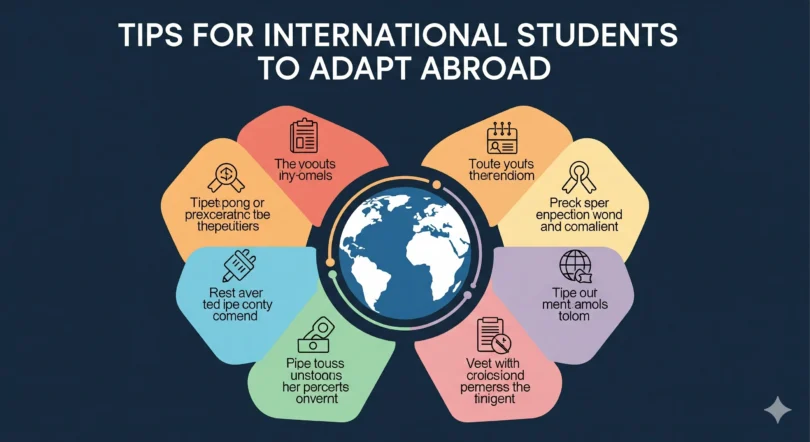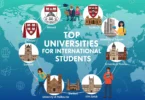Tips for International Students to Adapt Abroad
Introduction
Studying abroad is an exciting journey, but it comes with challenges. Adapting to a new country, culture, and academic system can be overwhelming for international students. With over 14 years of experience as a study abroad consultant, I’ve guided countless students to thrive in foreign universities and make the most of their international education.
Adapting successfully abroad requires a mix of planning, flexibility, and a proactive mindset. This post will provide actionable tips to help you navigate cultural differences, academic expectations, and social life while enhancing personal growth.
1. Embrace the New Culture
Cultural adaptation is one of the first hurdles for international students.
- Learn Local Customs: Understanding traditions, etiquette, and social norms prevents misunderstandings.
- Try Local Food and Experiences: Exploring local cuisine and festivals helps build connections and reduces homesickness.
- Be Respectful and Open-Minded: Accepting cultural differences fosters positive interactions with classmates and locals.
Consultant Insight: Students who immerse themselves in local culture tend to adapt faster and build lasting friendships.

Master the Academic System
2. Master the Academic System
Every country has unique academic expectations:
- Understand Grading Systems: Familiarize yourself with GPA, credits, and exam patterns.
- Engage in Class: Participate actively in discussions, seminars, and group projects.
- Seek Academic Support: Utilize tutoring centers, library resources, and office hours.
Consultant Tip: Early engagement in academics not only improves grades but also helps build confidence in a new learning environment.
3. Build a Support Network
Social connections are critical for adapting abroad:
- Connect with Fellow International Students: They understand your challenges and can offer guidance.
- Join Clubs and Societies: Universities offer numerous student organizations that align with interests and career goals.
- Mentorship Programs: Seek senior students or alumni mentors who can provide practical advice.
Consultant Advice: A strong support network reduces stress, homesickness, and fosters personal and professional growth.
4. Manage Homesickness and Mental Health
Being away from family and familiar surroundings can be tough:
- Stay Connected: Regular video calls with family and friends maintain emotional stability.
- Establish a Routine: Balanced schedules for study, exercise, and leisure reduce anxiety.
- Seek Counseling Services: Most universities offer free counseling for international students.
Consultant Insight: Prioritizing mental well-being ensures better academic performance and overall happiness abroad.
5. Develop Effective Communication Skills
Communication is key to adapting successfully:
- Improve Language Skills: Even in English-taught programs, mastering local language basics helps in daily life.
- Practice Public Speaking: Engage in group discussions and presentations to gain confidence.
- Active Listening: Understanding classmates, professors, and locals fosters better relationships.
Pro Tip: Strong communication skills enhance academic collaboration and social integration.

Financial Management
6. Financial Management
Managing finances abroad can be challenging:
- Create a Budget: Track tuition, accommodation, food, transportation, and leisure expenses.
- Look for Part-Time Jobs: On-campus or off-campus work (where permitted) provides extra income and experience.
- Scholarships and Grants: Explore university-specific and external scholarships to reduce financial stress.
Consultant Advice: Proper financial planning reduces anxiety and allows students to focus on academics and personal growth.
7. Adapt to Different Social Norms
Social adaptation goes beyond language:
- Understand Local Etiquette: Greetings, gestures, and public behavior vary by country.
- Respect Diversity: Accept differences in gender, religion, and lifestyles.
- Participate in Community Activities: Volunteer work or local events help integrate into society.
Consultant Insight: Being socially adaptable strengthens networking opportunities and cultural intelligence, crucial for a global career.
8. Take Care of Health and Well-being
Physical health is as important as mental health:
- Regular Exercise: Gyms, yoga, or outdoor activities reduce stress and boost energy.
- Balanced Diet: Explore local healthy options and maintain good nutrition.
- Healthcare Access: Learn about local healthcare, insurance policies, and emergency services.
Pro Tip: Staying physically healthy improves academic performance, focus, and overall experience abroad.
9. Set Realistic Expectations
Adapting abroad takes time, patience, and effort:
- Accept Challenges: Homesickness, cultural shock, and academic pressure are natural.
- Be Patient: Full adaptation often takes 6–12 months.
- Celebrate Small Wins: Progress in language skills, friendships, and academics keeps motivation high.
Consultant Advice: Students who manage expectations adapt faster and enjoy a more fulfilling international experience.

Engage in Personal Growth Opportunities
10. Engage in Personal Growth Opportunities
Studying abroad is an opportunity for self-discovery:
- Pursue Hobbies: Clubs, sports, and arts activities enhance creativity and relaxation.
- Attend Workshops: Skill-building events improve employability.
- Travel and Explore: Understanding the country and culture enriches the overall experience.
Pro Tip: International students who engage in diverse experiences develop independence, resilience, and a global perspective.
Conclusion
Adapting abroad is more than surviving; it’s thriving academically, socially, and personally. By embracing the culture, understanding the academic system, building networks, managing finances, and prioritizing well-being, international students can maximize their study abroad journey.









